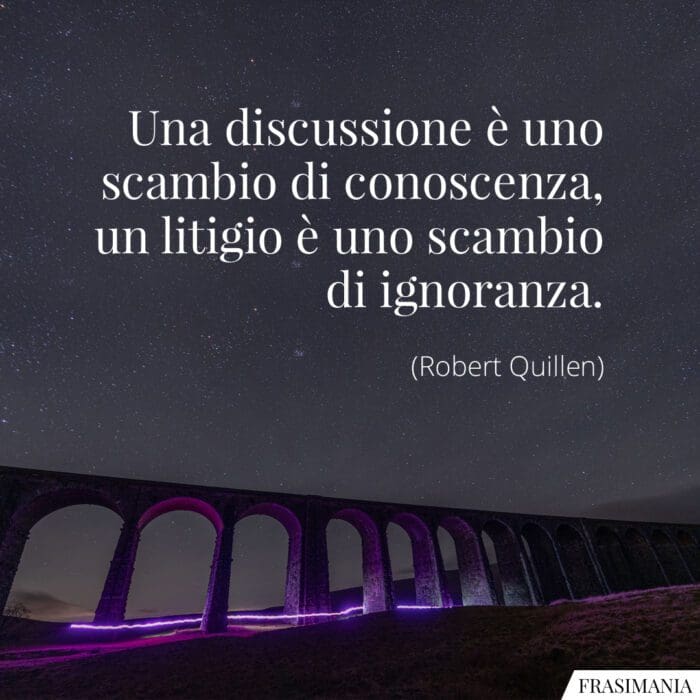
Le parole sono molto importanti nella nostra vita quotidiana, ma anche all’interno della società tutta. Riescono a delineare i nostri pensieri perché è su di loro che si basano, un po’ come i pezzi di un puzzle.
Alcune parole hanno il potere di cambiare il mondo e, a volte ne bastano veramente poche, usate bene, per esprimere concetti molto interessanti e profondi. Gli aforismi ne sono un esempio lampante. Allo stesso tempo, anche il silenzio è un modo di comunicare che spesso riesce a trasmettere forti emozioni.
Qui di seguito la nostra selezione delle più belle frasi sulle parole e sul parlare (in inglese e italiano) che ci faranno capire al meglio l’importanza di usarle correttamente. Eccole!
Aforismi, citazioni e frasi sulle parole e sul parlare in inglese (con traduzione)
- Whoever is able to say in twenty words what can be said in ten is capable of all other misdeeds as well.
Chi riesce a dire con venti parole ciò che può essere detto in dieci, è capace pure di tutte le altre cattiverie.
(Giosuè Carducci) - Better than a thousand hollow words, is one word that brings peace.
Una parola che porta la pace è meglio di mille parole vuote.
(Buddha) 
- Words have a longer life than deeds.
Le parole hanno una vita più lunga dei fatti.
(Pindaro) - In the course of my life, I have often had to eat my words, and I must confess that I have always found it a wholesome diet.
Nel corso della mia vita, ho dovuto spesso rimangiare le mie parole e devo confessare che l’ho sempre trovata una dieta molto sana.
(Winston Churchill) - Kind words do not cost much. Yet they accomplish much.
Le parole gentili non costano nulla. Tuttavia ottengono molto.
(Blaise Pascal) 
- Of all sad words of tongue or pen, the saddest are these, “It might have been”.
Di tutte le parole tristi di lingua o di penna, le più tristi sono queste: “Potrebbe essere stato”.
(John Greenleaf Whittier) - Words are men’s daughters, but God’s sons are things.
Le parole sono figlie degli uomini, ma i figli di Dio sono i fatti.
(Samuel Madden) - If you want to understand a person, do not listen to his words, observes his behavior.
Se vuoi capire una persona, non ascoltare le sue parole, osserva il suo comportamento.
(Albert Einstein) 
- The truth is not always beautiful, nor beautiful words the truth.
La verità non è sempre piacevole; le belle parole non sono verità.
(Lao Tzu) - Words – so innocent and powerless as they are, as standing in a dictionary, how potent for good and evil they become in the hands of one who knows how to combine them.
Parole: così innocenti e lievi quando stanno in un dizionario, quanto potenti nel bene e nel male si trasformano nelle mani di chi sa combinarle.
(Nathaniel Hawthorne) - In the end, we will remember not the words of our enemies, but the silence of our friends.
Alla fine, non ricorderemo le parole dei nostri nemici, ma il silenzio dei nostri amici.
(Martin Luther King Jr.) 
- The oldest, shortest words – “yes” and “no” – are those which require the most thought.
Le due parole più brevi e più antiche, “sì” e “no”, sono quelle che richiedono maggior riflessione.
(Pitagora) - You can speak well if your tongue can deliver the message of your heart.
Parlerai bene se la tua lingua riesce a trasmette il messaggio del tuo cuore.
(John Ford) - If your mind isn’t open, keep your mouth shut too.
Se la vostra mente non è aperta, tenete chiusa anche la bocca.
(Sue Grafton) 
- Words have the power to both destroy and heal. When words are both true and kind, they can change our world.
Le parole hanno il potere di distruggere e di creare. Quando le parole sono sia vere che gentili possono cambiare il mondo.
(Buddha) - No matter what people tell you, words and ideas can change the world.
Indipendentemente da ciò che la gente ti dice, parole e idee possono cambiare il mondo.
(Robin Williams) - He who does not understand your silence will probably not understand your words.
Chi non comprende il tuo silenzio probabilmente non capirà nemmeno le tue parole.
(Elbert Hubbard) 
- I know nothing in the world that has as much power as a word. Sometimes I write one, and I look at it, until it begins to shine.
Non conosco nulla al mondo che abbia tanto potere quanto la parola. A volte ne scrivo una, e la guardo, fino a quando non comincia a splendere.
(Emily Dickinson) - To speak as the common people do, to think as wise men do.
Parla come le persone comuni, pensa come le persone sagge.
(Roger Ascham) - Would’ve, should’ve, could’ve. The most painful words in the language.
Avremmo voluto, avremmo dovuto, avremmo potuto. Le parole più dolorose del linguaggio.
(Jonathan Coe) 
- Words are, of course, the most powerful drug used by mankind.
Le parole sono la più potente droga usata dall’uomo.
(Rudyard Kipling) - Speech is but a noise and books are only paper.
La parola non è che un rumore e i libri non sono altro che carta.
(Paul Claudel) - Silence is better than unmeaning words.
Il silenzio è meglio di tante parole insignificanti.
(Pitagora) 
- Some people’s idea of free speech is that they are free to say what they like, but if anyone says anything back, that is outrage.
L’idea di alcune persone della libertà di parola è che sono liberi di dire quello che vogliono, ma se qualcuno gli risponde, lo considerano un oltraggio.
(Winston Churchill) - When words lose their meaning, people lose their freedom.
Quando le parole perdono il loro significato, le persone perdono la libertà.
(Confucio) - Silence was never written down.
Un bel tacer non fu mai scritto.
(Iacopo Badoer) 
- There is a time for many words, and there is also a time for sleep.
C’è un tempo per i lunghi racconti, e un tempo per dormire.
(Omero) - Words are a pretext. It is the inner bond that draws one person to another, not words.
Le parole sono un pretesto. È il legame interiore che attira una persona all’altra, non le parole.
(Gialal al-Din Rumi) - We are masters of the unsaid words, but slaves of those we let slip out.
Siamo padroni delle parole non dette, ma schiavi di quelle che ci siamo lasciati sfuggire.
(Winston Churchill) - We have two ears and one mouth so that we can listen twice as much as we speak.
Se abbiamo due orecchie e una bocca, è per ascoltare il doppio di quanto parliamo.
(Epitteto) 
- Keep your thoughts positive because your thoughts become your words. Keep your words positive because your words become your behavior. Keep your behavior positive because your behavior becomes your habits. Keep your habits positive because your habits become your values. Keep your values positive because your values become your destiny.
Mantieni i tuoi pensieri positivi perché i tuoi pensieri diventano parole. Mantieni le tue parole positive perché le tue parole diventano i tuoi comportamenti. Mantieni i tuoi comportamenti positivi perché i tuoi comportamenti diventano le tue abitudini. Mantieni le tue abitudini positive perché le tue abitudini diventano i tuoi valori. Mantieni i tuoi valori positivi perché i tuoi valori diventano il tuo destino.
(Mahatma Gandhi) - I like good strong words that mean something.
Mi piacciono quelle belle parole forti che significano qualcosa.
(Louisa May Alcott) - Don’t talk about yourself; it will be done when you leave.
Non parlare di te. Lo faranno già gli altri quando te ne sarai andato.
(Wilson Mizner) 
- Words are finite expressions of the infinite mind.
Le parole sono espressioni finite della mente infinita.
(Ralph Waldo Emerson) - Watch your thughts; they become words. Watch your words; they become actions. Watch your actions; they become habits. Watch your habits; they become character. Watch your character; it becomes your destiny.
Guarda i tuoi pensieri, diventano le tue parole. Guarda le tue parole, diventano le tue azioni. Guarda le tue azioni, diventano le tue abitudini. Guarda le tue abitudini, diventano il tuo carattere. Guarda il tuo carattere, diventa il tuo destino.
(Lao Tzu) - Can words describe the fragrance of the very breath of spring?
Possono le parole descrivere la fragranza dell’aria di primavera?
(Neltje Blanchan) 
- Give sorrow words; the grief that does not speak knits up the o-er wrought heart and bids it break.
Date al dolore la parola; il dolore che non parla, sussurra al cuore oppresso e gli dice di spezzarsi.
(William Shakespeare) - People who know little are usually great talkers, while men who know much say little.
Le persone che sanno poco sono solitamente dei grandi parlatori, mentre gli uomini che sanno molto parlano poco.
(Jean-Jacques Rousseau) - To get some enemies you don’t need to declare war, just say what you think.
Per farsi dei nemici non è necessario dichiarare guerra, basta dire quel che si pensa.
(Martin Luther King Jr.) 
- If you can’t convince them, confuse them.
Se non puoi convincerli, confondili.
(Harry Truman) - Our chief defect is that we are more given to talking about things than to doing them.
Il nostro principale difetto è che siamo più portati a parlare delle cose che a farle.
(Jawaharlal Nehru) - The tongue can conceal the truth, but the eyes never.
La lingua può nascondere la verità, ma gli occhi mai.
(Michail Afanas’evič Bulgakov) 
- One should use common words to say uncommon things.
Si dovrebbero usare parole comuni per dire cose non comuni.
(Arthur Schopenhauer) - Whereof one cannot speak, thereof one must be silent.
Di ciò di cui non si può parlare, bisogna tacere.
(Ludwig Wittgenstein) - A hug is worth a thousand words.
Un abbraccio vale più di mille parole.
(Charles Caleb Colton) 
- One day I will find the right words, and they will be simple.
Un giorno troverò le parole giuste, e saranno semplici.
(Jack Kerouac) - If thought corrupts language, language can also corrupt thought.
Se il pensiero corrompe il linguaggio, anche il linguaggio può corrompere il pensiero.
(George Orwell) - Poetry: the best words in the best order.
Poesia: le migliori parole nel loro ordine migliore.
(Samuel Taylor Coleridge) - There is a voice that doesn’t use words. Listen.
C’è una voce che non usa parole. Ascoltala.
(Gialal al-Din Rumi) 
- However many holy words you read, however many you speak, what good will they do you if you do not act on upon them?
Per quante sante parole tu possa leggere, per quante parole tu possa dire, a cosa possono servire se poi non agisci di conseguenza?
(Buddha) - Of all animals in God’s creation, man is the only one who drinks without being thirsty, eats without being hungry and talks without having something to say.
Di tutti gli animali della creazione, l’uomo è l’unico che beve senza avere sete, mangia senza avere fame e parla senza avere nulla da dire.
(John Steinbeck) - Not to speak is to speak. Not to act is to act.
Non parlare è parlare. Non agire è agire.
(Dietrich Bonhoeffer) 
- Without knowing the force of words, it is impossible to know more.
È impossibile conoscere gli uomini senza conoscere la forza delle parole.
(Confucio) - The body says what words cannot.
Il corpo dice ciò che le parole non possono.
(Martha Graham) - It takes two years to learn to speak and sixty to learn to keep quiet.
Ci vogliono due anni per imparare a parlare e sessanta per imparare a tacere.
(Ernest Hemingway) 
- To know what people really think, pay attention to what they do rather than what they say.
Per sapere cosa pensano veramente le persone, presta attenzione a ciò che fanno piuttosto che a ciò che dicono.
(Cartesio) - Speak when you are angry and you will make the best speech you will ever regret.
Parla quando sei arrabbiato e farai il miglior discorso che mai tu possa rimpiangere.
(Ambrose Bierce) - The sweetest harmony is the sound of the voice of her whom we love.
L’armonia più dolce è il suono della voce di colei che amiamo.
(Jean de la Bruyere) 
- The reading of all good books is like conversation with the finest men of past centuries.
La lettura dei buoni libri è una sorta di conversazione con gli spiriti migliori dei secoli passati.
(Cartesio) - Value your words. Each one may be the last.
Risparmia le parole. Ognuna potrebbe essere la tua ultima.
(Stanislaw Jerzy Lec) - One of the hardest things in life is having words in your heart that you can’t utter.
Una delle cose più dure nella vita è avere parole nel tuo cuore che non puoi pronunciare.
(James Earl Jones) 
- Sweet words are like honey, a little may refresh, but too much gluts the stomach.
Le parole dolci sono come il miele, una piccola quantità ti ravviva, ma se son troppe ti bloccano lo stomaco.
(Anne Bradstreet) - The value of words lies in their reliability.
Il valore delle parole sta nella loro affidabilità.
(Lao Tzu) - It is better, in prayer, to have a heart without words than words without a heart.
È meglio, nella preghiera, avere un cuore senza parole che parole senza cuore.
(Mahatma Gandhi) - If it is not right do not do it; if it is not true do not say it.
Se non è giusto, non farlo. Se non è vero, non dirlo.
(Marco Aurelio) 
- By swallowing evil words unsaid, no one has ever harmed his stomach.
Inghiottendo parole malvagie non dette, nessuno ha mai danneggiato il suo stomaco.
(Winston Churchill) - When I cannot see words curling like rings of smoke round me I am in darkness — I am nothing.
Quando non riesco a vedere le parole arricciarsi come anelli di fumo intorno a me, sono nell’oscurità, non sono nulla.
(Virginia Woolf) - Every word has consequences. Every silence, too.
Ogni parola ha conseguenze. Ogni silenzio anche.
(Jean-Paul Sartre) 
- I don’t want just words. If that’s all you have for me, you’d better go.
Non voglio solo parole. Se è tutto ciò che hai per me, faresti meglio ad andare.
(Francis Scott Fitzgerald) - Words lead to deeds, they prepare the soul, make it ready, and move it to tenderness.
Le parole conducono ai fatti, preparano l’anima, e la portano alla tenerezza.
(Madre Teresa di Calcutta) - Discussion is an exchange of knowledge, argument is an exchange of ignorance.
Una discussione è uno scambio di conoscenza, un litigio è uno scambio di ignoranza.
(Robert Quillen) 
- Language is wine upon the lips.
Il linguaggio è il vino sulle labbra.
(Virginia Woolf) - Raise your words, not voice. It is rain that grows flowers, not thunder.
Alza le tue parole, non la voce. È la pioggia che fa crescere i fiori, non il tuono.
(Gialal al-Din Rumi) - Language is a virus from outer space.
Il linguaggio è un virus di un altro pianeta.
(William Burroughs) - Kind words can be short and easy to speak, but their echoes are truly endless.
Le parole gentili possono essere brevi e facili da pronunciare, ma il loro eco è infinito.
(Madre Teresa di Calcutta) 
- I speak to everyone in the same way, whether he is the garbage man or the president of the university.
Parlo con tutti allo stesso modo, indipendentemente che sia il netturbino o il presidente dell’università.
(Albert Einstein) - You learn to speak by speaking, to study by studying, to run by running, to work by working; in just the same way, you learn to love by loving.
Impara a parlare parlando, a studiare studiando, a correre correndo, a lavorare lavorando. Nello stesso modo, impara ad amare amando.
(Anatole France) - I turned silences and nights into words. What was unutterable, I wrote down.
Scrivevo dei silenzi, delle notti, di ciò che era inesprimibile.
(Arthur Rimbaud) - Think twice before you speak, because your words will plant the seed of either success or failure in the mind of another.
Pensaci due volte prima di parlare, perché le tue parole semineranno il seme del successo o del fallimento nella mente dell’altro.
(Napoleon Hill)



































